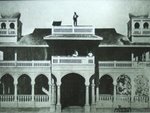This was posted on the Philippines Daily Inquirer on 10th October 2009:
+++++
What makes people happy?
By Rafael Castillo, MD
Philippine Daily Inquirer
First Posted 20:53:00 10/09/2009
Filed Under: Travel & Commuting, Tourism, Research, Health
BRUNEI DARUSSALAM is not really a popular tourist destination in Southeast Asia, but we were treated to a pleasant surprise after a short visit last week. Probably one of the world’s smallest states, it’s one of the wealthiest and has a high human development index, second only to Singapore in this part of the world.
But what is also most striking and palpable as one mingles with the people there is the sense of tranquility and happiness in the Bruneians, and those who have decided to call Brunei Darussalam their home. That includes around 22,000 happy overseas Filipino workers.
“I’m proud to be Filipino, but my family and I are happy where we are now,” said Bing Salazar, a 41-year-old tour organizer who has been working in Brunei for the last 18 years. “We work hard, yet out stress level is very low here. We also rarely get sick here,” Bing added.
Healthcare system
Crime rate in Brunei is hardly existent. Prevalence of diseases is one of the lowest in Asia. Their oil wealth allows the Brunei government to provide the population with one of Asia’s finest healthcare systems. You pay one Brunei dollar or around P33 for hospitalization or any surgery.
Despite having a lot of mangroves and swampy areas, malaria has been eradicated, and many other common infections in our country are virtually nonexistent in Brunei. There are only five general hospitals and other general health clinics but considering the relatively low disease prevalence, there seems to be no need to build more hospitals.
One is tempted to conclude that the Bruneians’ affluence is mainly responsible for their happiness and good health. “Probably to some degree yes,” Bing argued, “but I think Bruneians are generally simple and happy people who find happiness in even ordinary things in life.” He was suggesting that even if Bruneians were not naturally endowed with oil wealth, they would likely still be a happy people.
Health and happiness
“Bruneians put a premium on relationships,” Bing explained. And during the few days that we stayed there, it was quite evident that they not only nurtured family relationships but also friendships. We were there during the Hari Raya celebration and they welcomed to their households even strangers like us, akin to the Filipino hospitality during town fiestas. They were lavish with their hospitality, and even strangers would feel so much at home.
Indeed research has shown that people who value and nurture relationships and social interaction are likely to be happier. It has also proven that positive feelings and emotions in happy people increase their coping mechanisms to stress, build up the immune system, get sick less and make them more efficient and effective in the workplace. This is so because happy people tend to think more holistically and creatively, are more open to new ideas, and solve problems more quickly and intelligently.
But I guess the greatest dividends happy people get is their better health. And this is not mere coincidence. A study published last year in The American Journal of Health Promotion reported that of 9,981 Australians included in the study, those who reported a high happiness and life satisfaction are more likely a few years later to report good health.
About 63 percent of the study participants said they were happy most or all of the time. More than 90 percent claimed life satisfaction. These people were significantly more likely to report good health a few years later. The authors reported that those who were satisfied with life were 1.6 times as likely to report excellent, very good, or good health at the follow-up survey.
According to lead author Mohammad Siahpush, PhD: “Everything else being equal, if you are happy and satisfied with your life now, you are more likely to be healthy in the future. Importantly, our results are independent of several factors that impact on health, such as smoking, physical activity, alcohol consumption and age.” Doctor Siahpush is a professor of health promotion at the University of Nebraska Medical Center in Omaha.
Previous studies
This study is not isolated. Previous other studies on health and happiness reported similar conclusions. One of these is a study on nuns in the United States which found that those who reported happiness, hope and love in journals kept in their young adult years were likely to live longer lives.
Happiness is truly a state of the mind. A slum dweller may be happier than some people who live in mansions and carry with them heavy professional, social or political titles. Happiness is a decision one makes and is influenced more by a consistent happiness-seeking behavior.
That’s why happiness experts say that intentional activity, such as getting immersed in activities which make one happy, is a more significant major determinant of happiness rather than circumstances, which includes one’s wealth, position and education.
“Filipinos may not have the natural wealth the Bruneians have, but I’m sure we have the wealth of heart and mind that can make us also a happy people,” Bing said as he bade us goodbye at the airport. I smiled, silently hoping he was right.
Welcome to my private journal generally on Brunei issues. Any opinions expressed are in my personal capacity. All rights to the articles are reserved.
Saturday, October 10, 2009
Subscribe to:
Post Comments (Atom)







No comments:
Post a Comment